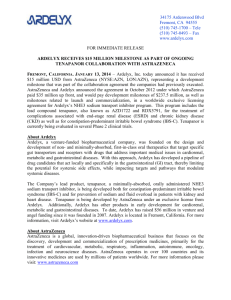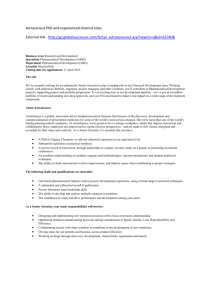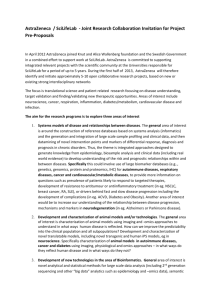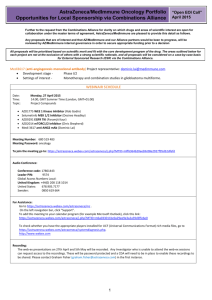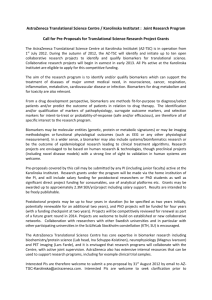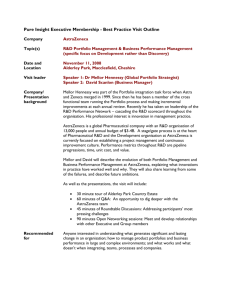Pharmaron and AstraZeneca: Working side by side to accelerate
advertisement
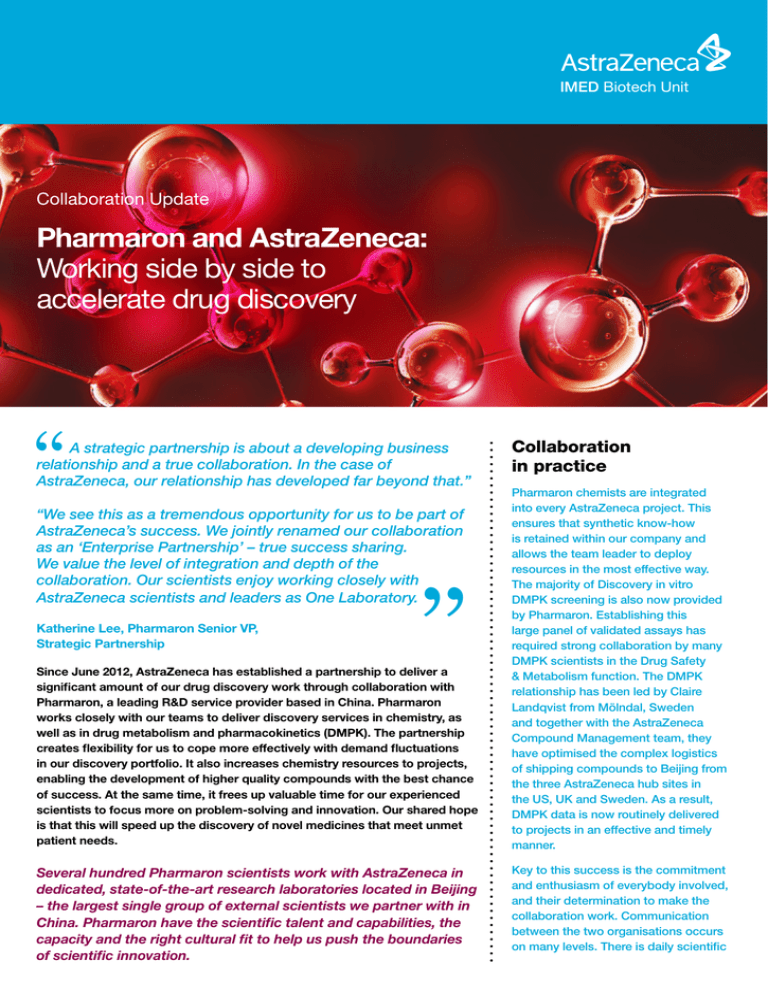
IMED Biotech Unit Collaboration Update Pharmaron and AstraZeneca: Working side by side to accelerate drug discovery “ A strategic partnership is about a developing business relationship and a true collaboration. In the case of AstraZeneca, our relationship has developed far beyond that.” “We see this as a tremendous opportunity for us to be part of AstraZeneca’s success. We jointly renamed our collaboration as an ‘Enterprise Partnership’ – true success sharing. We value the level of integration and depth of the collaboration. Our scientists enjoy working closely with AstraZeneca scientists and leaders as One Laboratory. “ Katherine Lee, Pharmaron Senior VP, Strategic Partnership Since June 2012, AstraZeneca has established a partnership to deliver a significant amount of our drug discovery work through collaboration with Pharmaron, a leading R&D service provider based in China. Pharmaron works closely with our teams to deliver discovery services in chemistry, as well as in drug metabolism and pharmacokinetics (DMPK). The partnership creates flexibility for us to cope more effectively with demand fluctuations in our discovery portfolio. It also increases chemistry resources to projects, enabling the development of higher quality compounds with the best chance of success. At the same time, it frees up valuable time for our experienced scientists to focus more on problem-solving and innovation. Our shared hope is that this will speed up the discovery of novel medicines that meet unmet patient needs. Several hundred Pharmaron scientists work with AstraZeneca in dedicated, state-of-the-art research laboratories located in Beijing – the largest single group of external scientists we partner with in China. Pharmaron have the scientific talent and capabilities, the capacity and the right cultural fit to help us push the boundaries of scientific innovation. Collaboration in practice Pharmaron chemists are integrated into every AstraZeneca project. This ensures that synthetic know-how is retained within our company and allows the team leader to deploy resources in the most effective way. The majority of Discovery in vitro DMPK screening is also now provided by Pharmaron. Establishing this large panel of validated assays has required strong collaboration by many DMPK scientists in the Drug Safety & Metabolism function. The DMPK relationship has been led by Claire Landqvist from Mölndal, Sweden and together with the AstraZeneca Compound Management team, they have optimised the complex logistics of shipping compounds to Beijing from the three AstraZeneca hub sites in the US, UK and Sweden. As a result, DMPK data is now routinely delivered to projects in an effective and timely manner. Key to this success is the commitment and enthusiasm of everybody involved, and their determination to make the collaboration work. Communication between the two organisations occurs on many levels. There is daily scientific Making great progress The team has made great advances in terms of creativity and problem solving. This is evidenced by the first joint AstraZeneca/Pharmaron publication, which was published in the Journal of Medicinal Chemistry from the GPR103 project in Mölndal, Sweden. Also, in our regular bi-monthly internal Chemistry Abstracts publication, we now see roughly equal contributions from AstraZeneca and Pharmaron. In addition, we have seen continued strong productivity and increased diversity of the chemistry being conducted in China. dialogue between chemists in both companies and our scientists take every opportunity to give lectures and provide coaching where needed but also encouraging Pharmaron scientists to work independently. What’s special about the collaboration? AstraZeneca perspective: “This collaboration goes beyond what we normally expect from a service partner,” says Garry Pairaudeau, Head of AstraZeneca’s Research Outsourcing Office. “They are continually willing to go the extra mile. By building a collaborative partnership based on high levels of engagement from all the AstraZeneca scientists involved and a genuine commitment from our partner, we have demonstrated that external partnering for Chemistry and DMPK can be effective.” Pharmaron perspective: “We’re very happy with this collaboration and see it as a true partnership. Appointing Pharmaron as sole partner for this work is a huge commitment from AstraZeneca, but it’s also a huge commitment from us, in terms of providing the right infrastructure, resources and new technology. Seeing our growth as being linked to AstraZeneca’s growth is an important way of thinking” says Yonghua Gai, Pharmaron’s VP Medicinal Chemistry. “AstraZeneca is different to Pharmaron’s other partners. We welcome the open and honest communication and sharing of information on the progress of projects. We also find it really motivating to think about the direct link between innovative drug discovery and benefits for patients.” Progress to date includes continued strong productivity and increased diversity of the chemistry being conducted in China as well as improved creativity and problem solving.The first joint AstraZeneca/Pharmaron publication was published in the Journal of Medicinal Chemistry from the GPR103 project in Mölndal, Sweden and in the regular bi-monthly internal Chemistry Abstracts publication we now see roughly equal contributions from AstraZeneca and Pharmaron.
